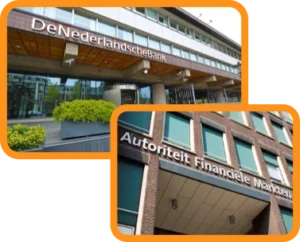Your Guide To Workplace Pension Funds in the Netherlands

In the Netherlands, employer’s pension (also called workplace pension or occupational pension) forms a crucial part of retirement income for most employees. Alongside private and AOW (state pension), workplace pensions ensure financial stability after retirement and are distributed to all workers in the country.
What Is a Workplace Pension?
People who work in the Netherlands can be covered by a workplace pension, an additional pillar of the retirement system. Depending on the industry you are employed in, you could already be participating in such a scheme. The different sectors have individual pension funds and agreements that outline the amount of pension you can get.
For example, temporary workers who work via the ABU/NBBU Collective Labour Agreement follow their own type of workplace fund – they receive a StiPP pension.
People who want to top up their retirement savings can contribute to separate funds called private pension schemes. The self-employed are not legally obliged to pay into a pension scheme; however, ZZP’ers (zelfstandigen zonder personeel) need to arrange their own pension if they want security after retirement.
While this may sound complicated, you can see that the Dutch pension system stands out internationally for its strong support of workers and their future financial security. Fewer than 10% of employees won’t be enrolled in an employer’s pension, and that is usually because they are independent workers who fill this gap with an alternative pillar in the Dutch pension system.
What Amount Does Your Workplace Pension Cover?
The employer and the employee (the latter is optional) pay into the occupational pension. Sometimes companies may pay the full amount, other times this could be split between the organisation and the employee. The contribution depends on your pension scheme and your earnings.
For example, some industries use ABP pension (if they are public personnel or educators), PFZW pension (if they work in healthcare), others may use StiPP Pensioenfonds (if they are temporary agency workers under ABU CLA), and so on.
Pension income is typically built up over years of contributions, and the final amount can vary based on several things:
- Years of service
- Average or final salary
- Contribution rate and investment returns
In most cases, employers provide 2/3 of your retirement savings, while you, the employee, will provide 1/3.
On top of all the contributions you add to your pension pot, you may also receive a holiday allowance. As you can see, the money you set aside as retirement savings can vary greatly depending on your specific employment situation. Let’s take a more detailed look at the various pension schemes you can come across throughout your career.
Types of Pension Funds for Employers
There are various schemes and funds in the Netherlands, and the one you will receive depends on your profession.
Industry-Wide Pension Funds (Bedrijfstakpensioenfondsen or BPFs)
These funds are mandatory, and participation in them is required by law in specific sectors, for example in healthcare, construction, education, the metal industry, cleaning, hospitality and others. As these are some of the most widespread professions in the Netherlands, roughly 70% of the Dutch workforce is covered by sectoral pension funds.
Collective Labour Agreements (Collectieve Arbeids Overeenkomst, or CAOs)
Collective Labour Agreements cover the employment conditions for all workers within a specific company or sector. We already mentioned ABU as an example of a CLA. The agreements outline information such as wages and salary scales, working hours, overtime policies, holiday pay, bonuses and of course, pension arrangements. Depending on the industry, these arrangements can be mandatory. However, even if not strictly required by law, CAOs can oblige employers to participate in pension schemes.
If you’re searching for a job in the Netherlands, it’s good to be aware that a CAO takes precedence over any individual employment contract – organisations must follow its terms. Although many CAOs apply to entire sectors, you may also encounter company-specific agreements that set out unique conditions for employees within the company.
Other Sector-Specific Mandatory Schemes
Professions such as medical specialists, architects, and psychotherapists, among others, require the use of specific mandatory funds. Overall, you can come across general ABP pension funds, sectoral pension funds (BPF, which we covered above), company OPF pension funds, and more. You can browse them via specific professional groups, industry and syndicates (in Dutch) here. Some freelancers are also covered by independent pension funds. For instance, if you are a dentist with a private practice, then you would follow your profession-specific fund.
Types of Contributions
By January 1, 2027, due to the Future Pensions Act, the way that your pension will be calculated is about to change. Some employers may have to adjust to the new ruling, transitioning from a benefit scheme to a contributions scheme (with the exception of employers who offer an average pay pension). Let’s take a look at the differences:
- Defined Benefit Scheme (DB): Your retirement income is based on the average salary in a particular year. These schemes often feature conditional indexation. In practice, this means that both your accrued benefits (the money you collected while you’re still working) and your pension payments (the money you have collected once you retire) are supposed to be adjusted annually to keep up with inflation or wage increases in your sector. However, these adjustments are not guaranteed – they only happen if the pension fund is financially healthy and able to afford them.
- Defined Contribution (DC): The amount of pension you eventually receive depends on how much you and your employer contribute over your working life, as well as the investment returns earned on those contributions. At retirement, the total accumulated sum is converted into regular pension payments.
Simply put, a DB scheme is income-based, and a DC scheme is capital-based. The switch will not only make retirement savings less volatile but will prove fairer for younger workers.
Taxation
One of the biggest perks of workplace pension funds is tax relief: contributions to your occupational pension are tax-exempt, even if the amount increases throughout the years. However, it’s important to keep in mind that once you reach the Dutch pension age and begin receiving your retirement funds, they will be considered taxable income and will therefore be subject to monthly deductions. Many pensioners are surprised to discover this fact, so make sure you plan accordingly.
Who Is the Pensions Regulator?
Just like most legal and financial sectors in the Netherlands, pension schemes are kept under a pretty watchful eye. Two main regulatory bodies oversee them:
| Regulatory Body | Role |
|---|---|
| DNB (De Nederlandsche Bank) | Monitors financial health and risk management of pension funds. |
| AFM (Authority for the Financial Markets) | Oversees transparency, communication, and participant protection. |
What Happens to My Pension Fund If I Change Jobs?
Changing jobs within the Netherlands doesn’t mean losing your accrued pension. You have several options when you find a new job:
- Leave your pension as it was in the previous fund (deferred pension).
- Transfer pension rights to your new pension fund (waardeoverdracht).
- Build up a new pension with the new employer while keeping the old one.
Some advice from our recruitment agency:
During the job-hunting stage, check the pension arrangements of the companies you are applying for if you don’t want gaps in your pension investment. You can ask your interviewer the following questions about your pension rights:
- Is pension participation mandatory?
- What type of scheme is offered (DB or DC)?
- Is there an employer contribution, and how much?
Of course, if you are being hired through Blue Lynx, we always make sure to inform you of all your rights, benefits, and we get you in touch with strictly compliant employers.
The Future Pensions Act
 By 1 January 2027, most pension funds will transfer to the laws outlined in the Future Pensions Act, the impact of which has been widely discussed. The last time Dutch Pension Law underwent such a massive change was in the 1950s. The financial burden for both parties is increasing, but companies will continue to shoulder the higher cost.
By 1 January 2027, most pension funds will transfer to the laws outlined in the Future Pensions Act, the impact of which has been widely discussed. The last time Dutch Pension Law underwent such a massive change was in the 1950s. The financial burden for both parties is increasing, but companies will continue to shoulder the higher cost.
What Has Forced These Changes?
Why are the new changes getting everyone’s feathers ruffled these days? In recent decades, Dutch life expectancy has grown significantly, which means that the rising number of retirees is being supported by contributions from a relatively small group of working-age individuals. This situation is complicated further by the increasing number of freelancers, many of whom do not contribute to employer-based schemes, leading to a gradual decline in overall pension funding.
The Future Pensions Act aims to address these challenges. The government plans to reform the pension system, with January 1, 2027, set as the deadline for the switch. Those who do not make the necessary changes according to the new rulings can face fiscal consequences. While getting more pension may sound like an excellent perk, for many workers this adjustment is taken straight from their NET salary or bonuses, with little alternatives from the government. It remains to be seen what impact these adjustments will ultimately have on employers and employees.
Do ZZP’ers Have to Pay Employer’s Pension?
In the Netherlands, ZZP’ers, self-employed professionals, are not legally required to participate in a pension scheme, and since they do not have an employer, they don’t pay an employer’s pension. However, this is changing gradually under government pressure. Here is what’s changing for independent workers:
- The Future Pensions Act opens the door for more sector-specific obligations and easier access to pension funds for ZZP’ers.
- Political discussions continue about making pensions mandatory for some freelance sectors, especially in platform work, construction and media.
- From 2026, some new fiscal incentives and default enrolment schemes may be introduced to encourage or semi-automate pension savings for freelancers.
Key Takeaways
- Less than 10% of employees in the Netherlands don’t participate in workplace pension schemes.
- Depending on your sector or status (e.g., temporary worker, freelancer, permanent), you may fall under a general, sectoral or company pension fund.
- Workplace pension contributions are tax-exempt during your working life but taxable once you start receiving benefits.
- By January 1 2027, the Future Pensions Act will change how pensions are calculated and managed.
